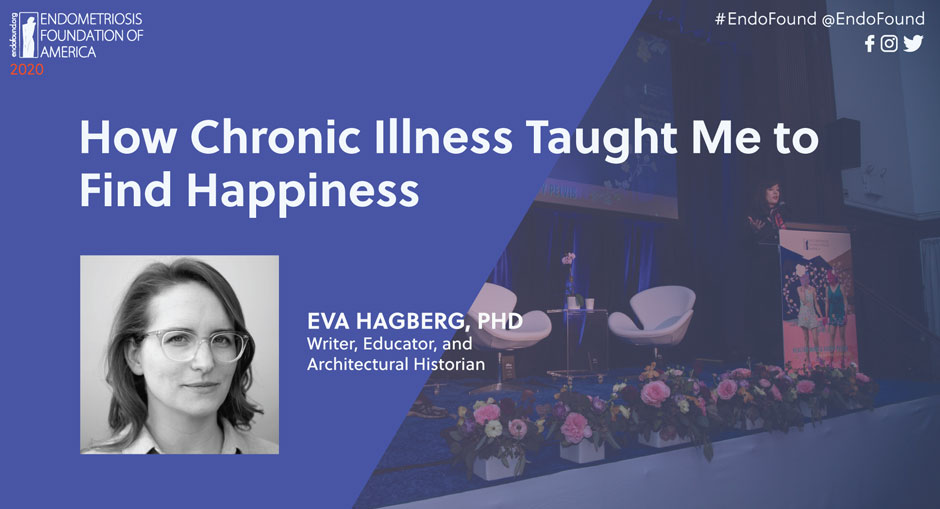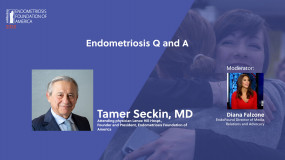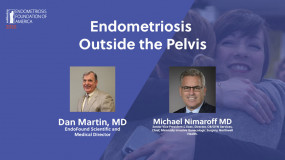Endometriosis Foundation of America
Virtual Patient Conference, October 16-18, 2020
How Chronic Illness Taught Me To Find Happiness : Eva Hagberg, PhD
Margaret Caspler Cianci:
But now it is my honor to introduce them Eva Hagberg talking about how chronic illness taught me to find happiness. Even is a New York-based writer, educator, and an architectural historian. She holds a PhD in visual and narrative culture from UC Berkeley, and degrees in architecture from UC Berkeley and Princeton. Her writings are about design, feelings and people, and have all been widely published. We are delighted to welcome her back to Endo Found. Eva spoke with us earlier in the spring when we were all experienced initial effects of COVID and how it was particularly affecting the endo community. But we're delighted to have her back today for our final formal presentation, Eva.
Eva Hagberg:
Hi, I'm so, so, so happy to be here. I'll explain why I'm in front of a drill press. We're going to get there. But I was thinking about what to say, and I know that, first of all, thank you everybody for organizing this and thank you so much for inviting me. And I think if I had been in the depths of my suffering and somebody had said, "This is going to be great, this is going to work out amazing," I would have been like, "I don't want to hear it." So if you don't want to hear what I have to say, you're totally invited to stay anyway. But I'm going to tell you a little bit about what happened before I got sick, what it was like before I got sick, and then when it happened when I did.
So I'm sort of a classic endometriosis case. I had really painful periods. I'd be falling down on the floor at the mall in front of my mom. And she'd be like, "It's just a period. What's going on?" But I had no idea that I had endometriosis until I was, I think, 30, 31 or 32. Right? So aside from my periods, I was like, "I'm a basically healthy person." And as you probably can guess from my obsession with how many degrees I have, I live from the neck up. I was just in my brain. I'm from a family that's really oriented towards achievement. And I was like, "That is my purpose on this earth." I was brought here to get degrees and write books and maybe get married at some point just because that's what my family wants, maybe have some friends, but social life and my feelings were not anywhere in my field of view.
I went to grad school and I was in my first year. And I remember I was just so obsessed with, again, achievement, getting into the PhD program really quickly. And one day I fainted and I went to the hospital and they were, "We can't figure out what's wrong with you." And after a week of being in the hospital, I finally got a brain MRI and I'd actually had a cyst in the center of my brain that ruptured, so I had a brain hemorrhage at 30. And I remember thinking, I think everything is going to change now. And I had no idea how it was going to change, but I had this moment where I was lying in the hospital bed and a brain hemorrhage affects your brain. This is sort of what I wouldn't have expected, but I realized, and I just overnight lost a lot of my capacity to think. I lost a lot of my capacity to communicate.
I remember my doctor being like, "Do you want a sandwich?" I was like, "What are you asking me?" I was just really, really out of it. And what happened is that experience removed all this armor that I'd built up over years, armor that I'd gotten from my family, from my parents, from this obsession with achieving. My boyfriend met my mom the other night and he was like, "Oh, I see why you always have to brag about what you do," because that's how I learned to get love. Right? It was just achieving.
So I have this brain hemorrhage I'm in the hospital. I have endometriosis, but don't know I do. And what happened was extraordinary. What happened is that my friends, who I had been not that great of a friend to, to be honest, because I was obsessed with working all the time, showed up and they taught me what it felt like to accept love. And I would say at the beginning of my experience with illness, I was like, "I'm fine." I ended up having to get a bunch of surgeries. The first one, a random person drove me. I didn't really have a plan. I didn't really know how to ask for help. By my seventh surgery, Dr. Seckin remembers this, I had an entourage with me at the hospital. I think I had six or seven people come with me to surgery because I learned that that's what was going to that's what was going to get me through.
And so, I was really seriously sick after the brain surgery, ended up getting over that, and then we started finding things in my ovaries. In, on, next to, I think we've a lot of us have experienced is a thing, it's somewhere. And so, I started getting a lot of gynecological surgeries. And again, I just tried to make it, and this is going to sound weird, but I try to make it fun in a way, because I was like, "I can't avoid this surgery. I can't avoid this procedure. I can't avoid this pain." I had so much physical pain, and I'm sure they'll a lot of us on this call can relate to that. And I tried for a couple months to have magical thinking and be like, "Maybe the pain won't happen. And finally I was like, "Okay, there's just going to be pain in my life. That's just sort of have in this lifetime, that's going to be part of it. So I'm going to try and make the most of it."
And so, my friends and I would get matching shirts, we'd get matching yoga pants and wear them to the surgeon's office. I would always go to my favorite cupcake place after I went to Stanford Hospital. And it was little things like that, and I know that this is so cliche and until I experienced it, I wouldn't have believed it, but it truly was this one way in which being so sick and so scared all the time forced me to find joy and happiness in the tiniest moments.
And so, I remember being on the neurosurgery floor and they had this freezer full of popsicles. And one night the nurse was like, "You get to go pick your own Popsicle." And I was so elated. And things like that I don't forget now. I think one of the things that illness taught me was really to not take my health for granted, which again sounds obvious. But the fact that I'm sitting here today, I knew that I was going to be able to participate in this. I knew that I could show up, I could trust my brain to work for 10 minutes, if not longer, all of that is something that I expected to lose forever.
And I remember when I realized that I had endometriosis, and I went through a lot of, I think I've had four surgeries for endometriosis. And the first, when I was diagnosed, I was like, "Okay, I don't really know what that means. I've heard about this on Instagram maybe." I didn't take it seriously. My second surgery, I was like, "This is surprising that this has come back so quickly, but okay, we'll take out the other cyst. This is probably fine." My third surgery, I was like, "This is surprising that I have yet another thing on my ovary." And then my fourth surgery, that was my excision surgery that I got with Dr. Seckin, and there was so much going on that nobody else had seen before. And it was really major. And I remember being really scared before and incredibly relieved after.
And what I realized, what I was thinking about a lot today, is that because of all those experiences of suffering so much and learning to find all this joy and learning to enjoy a cupcake or matching yoga pants or whatever, and most importantly, let people love me, let people show up for me, turn my surgeries into an overnight hospital room party, which is what we did, that I'm able now, eight or nine months later, to still appreciate how much it was able to change my life. It wasn't like I was really tired and then I got surgery and I was like still sort of tired and sad. It's like, I got this surgery and it removed all the physical disease. And because I've done so much work internally and surrounded myself with people that were just so kind and so loving that now I'm able to have this really, really extraordinary life.
So this drill press. I'm in my partner's loft. I met him... I don't know, I met him a little while ago. Redemptive love stories are definitely a trope. It's a cliche, but I think that mine is true. I had a level of fearlessness when I met this person because of everything that I'd been through. And I remember dating used to be really scary and really hard and overwhelming and confusing. And I just kept thinking, I've had seven surgeries, I've had four surgeries for endometriosis. Nothing that this guy is going to say is going to be a scary or as overwhelming as that. So I'm just going to go for it and I'm just going to be myself.
And here I am and I have now adopted a cattle dog who's incredible. And I'm sitting in his shop and I get to just remember every single second that I have, I have fought for, other people have fought for. The Endometriosis Foundation, all of you, all of the doctors on this call, all the surgeons on this call, there are so many people that have gone before me that have done research and practice and all of that, and I feel like it's my opportunity to take advantage of all of those gifts. And it's not even about giving back or earning it, but it's like I have this path that all of you have paved for me and I just get to walk it and enjoy my life so much.
So I used to be really upset that I was really sick. And I now feel like the rest of my life gets to be so different and so rich and so beautiful because of how dark and difficult and hard it got and how much I was loved all the way through. So I hope that that is in some way helpful, in some way hopeful. And I'm just so happy to be here. And thank you so much for inviting me to be a part of this.
Margaret Caspler Cianci:
Eva, that's a tremendous story and I'm sure everyone out there is just amazed at your journey. And many of them can relate to what you've gone through, perhaps. I don't know about the seven surgeries. But the fact that you feel powerful is such a tremendous feeling. And I think that's probably part of the biggest problem for the endo community. They feel so powerless because the medical community isn't listening to them and they're trying to advocate for themselves. So we so appreciate your sharing your journey and this very, very uplifting story with a happy ending. So we look forward to reading your book. Anybody who wants more information about Eva's book can find it on our bookshelf. On our website. And we also very much want to thank you for just being an important voice out there for us and for the endo community. So Eva, many, many thanks.
Eva Hagberg:
Thank you.










